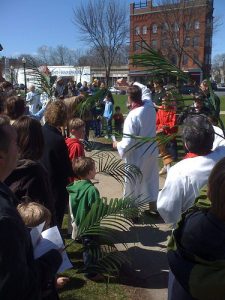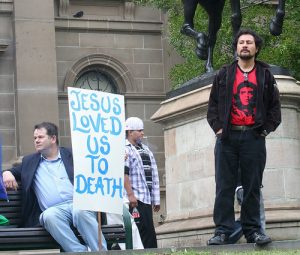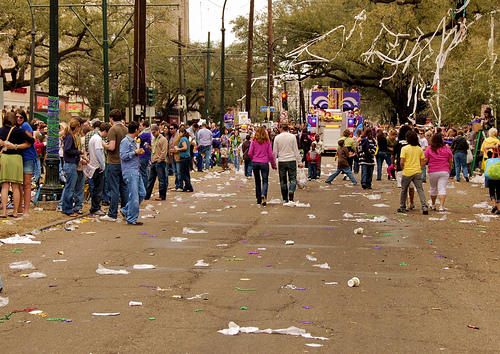RCL Reflection for Palm/Passion Sunday, Year A
Lessons: Isaiah 50:4-9a, Psalm 31:9-16, Philippians 2:5-11, Matthew 27:11-54 (Liturgy of the Passion); Psalm 118:1-2, 19-29, Matthew 21:1-11 (Liturgy of the Palms)
Theme: God’s faithful and generous people enter Holy Week with open hearts, minds, and time to participate fully in the life of the congregation. We acknowledge in our choices and decisions that everything is an act of stewardship—of time, of talent, of resources, of self—of every aspect of life.
Key Scripture: Let the same mind be in you that was in Christ Jesus, who, though he was in the form of God, did not regard equality with God as something to be exploited, but emptied himself, taking the form of a slave, being born in human likeness. And being found in human form, he humbled himself and became obedient to the point of death— even death on a cross. Philippians 2:5-8
Preaching/Teaching Reflection
Everybody loves a parade, right? From the televised wonder of the Macy’s Day Thanksgiving Parade to every  small town celebration of the Fourth of July, parades bring us together to honor, to celebrate, to share.
small town celebration of the Fourth of July, parades bring us together to honor, to celebrate, to share.
I remember vividly a chilly morning in 1968. I sat on the wide, cool marble window sill of my father’s office in the Nashville Federal Building, fidgeting impatiently and looking through the class down on the crowds gathered for the annual Christmas parade. I was not happy and longed to be on the sidewalk in the thick of the action instead of trapped in climate-controlled agony. I wanted to see Santa up close and personal, to catch some candy thrown from his elaborate float. My father, of course, thought he was doing us both a grand favor by providing me with an eagle’s eye view, warmth, and a Coke from the vending machine. I thought he was being a huge party-pooper by not jostling “super-hero-style” for a spot at the edge of the crowd.
I don’t remember much else about that particular parade. I’m sure it was a fine affair with majorettes and marching bands, a host of themed floats, Shriners in red fezzes driving motorbikes and funny cars, prancing horses, and, of course, Santa. The impression I have carried all these years was that I watched it from afar, not from street’s edge amidst the magic and wonder where I longed to be.
It never occurred to me then to wonder about the preparation and clean up necessary to stage the event. Who picked up the stray popcorn, paper hotdog trays, candy not collected by scrambling children, confetti, cigarette butts, and horse offal never crossed my childish mind. By Sunday morning, however, virtually every trace of the parade was swept away, leaving downtown Nashville clean and ready for the new week’s traffic. Yes, we love parades, we love to be part of the action, but we think not on the mess that’s left behind.
For those of us in the liturgical tradition, this Sunday marks the beginning of “Parade Season” in the church. Palms will wave as congregants sing “All Glory, Laud, and Honor.” It is a triumphant and fun moment. Some will fold their palms into crosses, others will tickle their siblings’ ears with the palm tips, and all will leave at the end of the service to go back into the world and “real life.” Then the big daddy of all parades–Easter Sunday–will draw us back again one week later. There will not be as many new frocks, bonnets and gloves, and white patents as there were in the 1960s, but pews will be packed and the heady scent of lilies will swirl through the air amidst the clarion notes of brass and organ swell. Again, it is a triumphant day–a feel good day. We will celebrate our Lord’s triumph over death, our salvation, and our identity as resurrection people. Yes, everybody loves a parade.
But wait a minute! What about the six days between those two Sundays? What of Holy Week? What happens between the festive flair of Palm/Passion Sunday and the joyous holy commotion of Easter and the empty tomb? Who cleans up the mess in between?
The answer, of course, is God the Son. We are invited to walk along, to shoulder our “trash bag” and pick up the pieces in the footsteps of our Lord. The question is will we take the time and effort to walk amid the dirt and refuse of our lives and those of our sisters and brothers? Are we able to open our eyes and see beyond the last marcher, the last reveler?
Jesus picked up the trash, cleaning up the scum and stain of our sins and brokenness once and for all. Yes, dear friends, there is a story between the parades that we do well not to miss. The work and witness of Holy Week beckons. Without fully experiencing Holy Week, we lose something valuable–a behind-the-scenes look at the real cost of our salvation and the dirty work it took to accomplish it. Do we, like my father did with me so  many years ago, bring ourselves and our family to window of Holy Week to gaze out dispassionately on a distant story, safe and secure on our marble window sils and smooth wooden pews?
many years ago, bring ourselves and our family to window of Holy Week to gaze out dispassionately on a distant story, safe and secure on our marble window sils and smooth wooden pews?
What if, dear friends, what if we truly enter into Holy Week and the story of Jesus’ walk to the cross? We have a unique opportunity to experience these days in word, in Sacrament, in deed, and in solidarity with our sisters and brothers, with every molecule and atom of this beautiful broken world. Yes, everybody loves a parade, but to truly appreciate one we must go behind the scenes, we must encounter the trash and the smelly, messy lives. We must walk with Jesus.
May this week bring you new revelations, deeper faith, and a holy discomfort on your way to the empty tomb. Blessings on your journey.
In Worship
Worship for Palm/Passion Sunday is usually pretty firmly set and reflective of congregational traditions and practices. However, if you’re looking for some powerful and varied options for music and images, or if you just want a little fresh inspiration try these three possibilities:
The first one is a Palm Sunday visual collage set to U2’s song “Peace on Earth.” The second on is a Palm Sunday collage set to Chris Tomlin’s “All Bow Down.” The final one is a lovely rendition of “Ride On! Ride on in Majesty!” sung by the King’s College Choir, Cambridge.
With Youth
Teach (or reteach) your youth how to make palm crosses. You can find various sets of step-by-step instructions and instructional videos on the Internet. But don’t stop there! Print small invitations with your Holy Week and Easter Day worship schedules on them, and take to the streets around your congregation or in the nearest town center to give out palm crosses and invitations to come to worship. Help youth practice inviting people by having them share which worship service is their favorite and what they find meaningful in it. Equip them to tell people why they have folded their celebration palms into crosses. Pray before you go that God will open your lips and your neighbors’ hearts and minds.
With Children
Palm Sunday was a joyous celebration in Jerusalem. When Jesus came riding in, people’s hopes and dreams were reignited, and they had high hopes. But these hopes were quickly squelched when Jesus was arrested as a common criminal. Where was their king? We still have one week until Easter.
For a children’s sermon, consider talking about the history of parades. An elementary curriculum that may prove useful is found here.
You might also consider making “crackers” with the children (or beforehand if your time is short). These traditional British party favors show up at Christmas, New Year’s, and other celebratory times. Fill the crackers with small Easter candies, Easter stickers and symbols, and colorful strips of paper on which are printed plenty of “Alleluias.” Seal them, decorate them, and send them home with instructions to wait until the Easter Vigil or Easter morn to “pop” them. That’s when we can really celebrate! Click here for instructions from PBS Parents.
Weekly Stewardship Bulletin Insert
So what in the world does Palm/Passion Sunday have to do with stewardship? As God’s faithful people we can answer with certainty: A lot! First of all, how we steward this story of faith and how we allow it to shape our entry into fully participating in Holy Week is an act of stewardship. Arranging our busy schedules to make time this week to fully immerse ourselves into the worship life of the Great Triduum (Maundy Thursday, Good Friday, and Easter Vigil) is an act of stewardship. We are also called to be good stewards of resources when we choose eco-friendly palms, for example, or when we opt for non-styrofoam cups for coffee hours and Easter breakfast. In short, every decision or choice we make has stewardship implications. Ponder this notion during the days of Holy Week as you contemplate how our Lord Jesus Christ fully invested himself in the redemption of this entire creation.
Stewardship at Home
The week leading up to Easter—Holy Week—may also be a time of preparation that provides opportunity to contemplate stewardship. Do you plan to give Easter baskets this year? If so, might you aim for a zero or low waste basket? Click here for more information. Will you be purchasing chocolate to fill those baskets? Is your chocolate from fairly-traded sources or might it possibly be contributing to the global human trafficking problem? Click here for more information. Finally, instead of purchasing plastic eggs to fill, how about using natural dyes to decorate real eggs? And what about the cost of that Easter dinner feast? Could you consider donating an amount equal to what you are spending to a world or local hunger ministry? Above all, spend time in prayer this week asking God to help you work on better stewardship of every aspect of your life.
Photos: Doug Bezaire & Susi Havens-Bezaire, technodad, and Takver, Creative Commons. Thanks!
Note: Reprint rights granted to congregations and other church organizations for local, nonprofit use. Just include this note: “Copyright (c) 2017, Rev. Sharron Blezard. Used by Permission.” Other uses, please inquire: thewritelife@hotmail.com.




Leave a Reply